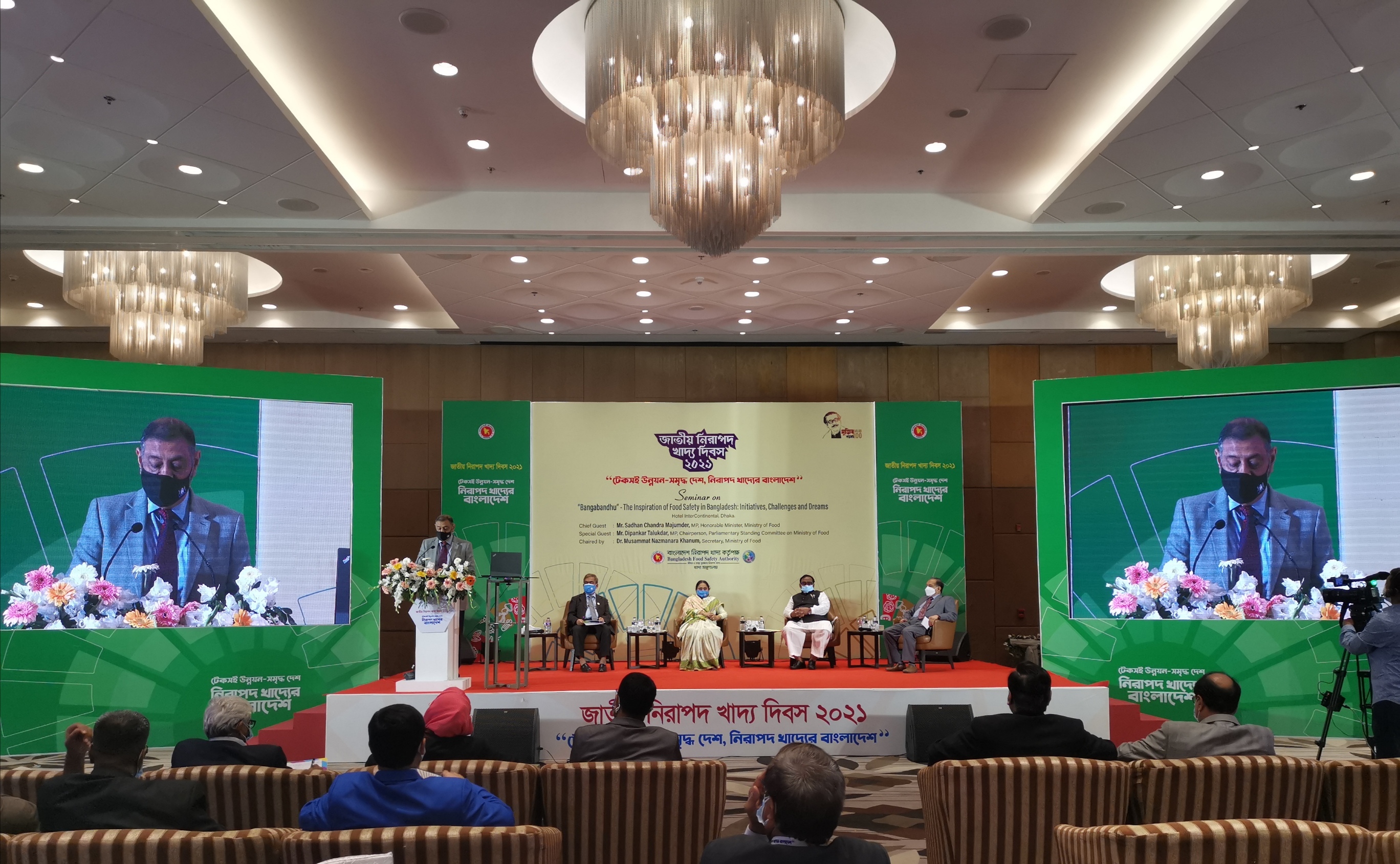Speech by Dr Bardan Jung Rana, WHO Representative to Bangladesh

On the occasion of the National Food Safety Day 2021, WHO reiterates its efforts to mainstream food safety in the public agenda and reduce the burden of foodborne diseases globally. Our aim is to achieve a world capable of preventing, detecting and responding to public health threats associated with unsafe food.
Access to sufficient amounts of safe and nutritious food is key to sustaining life and promoting good health. Unsafe food containing harmful bacteria, viruses, parasites or chemical substances can cause more than 200 different diseases – ranging from diarrhoea to cancers. Around the world, an estimated 600 million – almost 1 in 10 people – fall ill after eating contaminated food each year, resulting in 4,20,000 deaths and the loss of 33 million healthy life years. Unsafe food creates a vicious cycle of disease and malnutrition, significantly affecting infants, young children, the elderly and the sick. One hundred ten billion US dollars are lost each year in productivity and medical expenses resulting from unsafe food in low- and middle-income countries.
Besides contributing to food and nutrition security, a safe food supply also supports national economies, trade and tourism, and stimulates sustainable development. The globalization of food trade, a growing world population, climate change, and rapidly changing food systems impact food safety. Globalization has triggered growing consumer demand for a wider variety of foods, resulting in an increasingly complex and longer global food chain.
Food safety is an essential determinant for public health and nutrition both in developed and developing countries, including Bangladesh. And it is a priority, as food safety is fundamental to achieve the national goals of food and nutrition security.
In 2013, the Bangladesh Food Safety Act 2013 was passed, and it supersedes the previous legislations. The Act includes provisions for national governing and implementing structures and legitimizes establishing a national food safety authority, the Bangladesh Food Safety Authority (BFSA), to implement the Act and coordinate all food safety and food control activities in Bangladesh.
Bangladesh has a long track record of working with FAO and WHO, including the CODEX Commission and INFOSAN. Bangladesh already adopted the FAO/WHO guidelines for strengthening national food control systems; food control assessment tools; codex training materials; food incident management; early warnings and emergency response guidance; and food recall systems. Bangladesh was also selected for a global study on antimicrobial resistance. Furthermore, the country is also updating the Food Safety curriculum of BSc Health Technology and National Dietary Guidelines.
Despite the achievements, though, in Bangladesh, many of the food items, either produced, manufactured or processed, are unsafe for consumption or adulterated by using various harmful chemicals, toxic artificial ingredients and colours at varying degrees. This problem persists at every level of the food chain from preparation to consumption. Urbanization and changes in consumer habits, including travel, have increased the number of people buying and eating food prepared in public places. These challenges put greater responsibility on food producers and handlers to ensure food safety.
The human resources at BFSA are minimal and presently partially able to assume an apex food control agency's operational responsibility. Several activities carried out by MoHFW are officially the mandate of BFSA and need to be endorsed and approved through agreements of cooperation. For example, the nutrient profile to categorize healthy and un-healthy packaged foods, front of pack labelling and implementation of regulations, to mention a few. Institutional adjustments are needed to improve the coordination between the MoHFW and BFSA to avoid duplicating activities and implement vigorously.
The WHO Food Safety programme leads the global efforts to lower the burden of diseases. In Bangladesh, WHO helps the Government develop food safety related policies and successfully implement risk-based foodborne disease surveillance, prevention, and control programmes.
Under the mentioned theme of this year’s food safety day, it is time to call upon decision-makers, the private sector, civil society, UN organizations and the general public to act.
Now, in this Mujib Borsho it is time to reiterate the steps taken by Bangabandhu in various fields and to realize, review and implement his dreams in order to build a developed Bangladesh. It is time to implement the food safety regulations at the national and sub-national level in a coordinated manner. It is time to strengthen food safety inspectors' capacity, support healthy food vending, and improve capacity development in the value chain. Good collaboration between the Government, producers and consumers is essential to reach this scope and ensure food safety at the country level, as food safety is a shared responsibility. We all have a role to play in keeping the food safe, from farm to table. Whether we grow, process, transport, store, distribute, sell, prepare, serve or consume food, we can ensure the food we consume is safe and will not cause damages to our health.
We are all in this together.
I wish this programme all the success and to you a happy and more aware National Food Safety Day.
Thank you.
